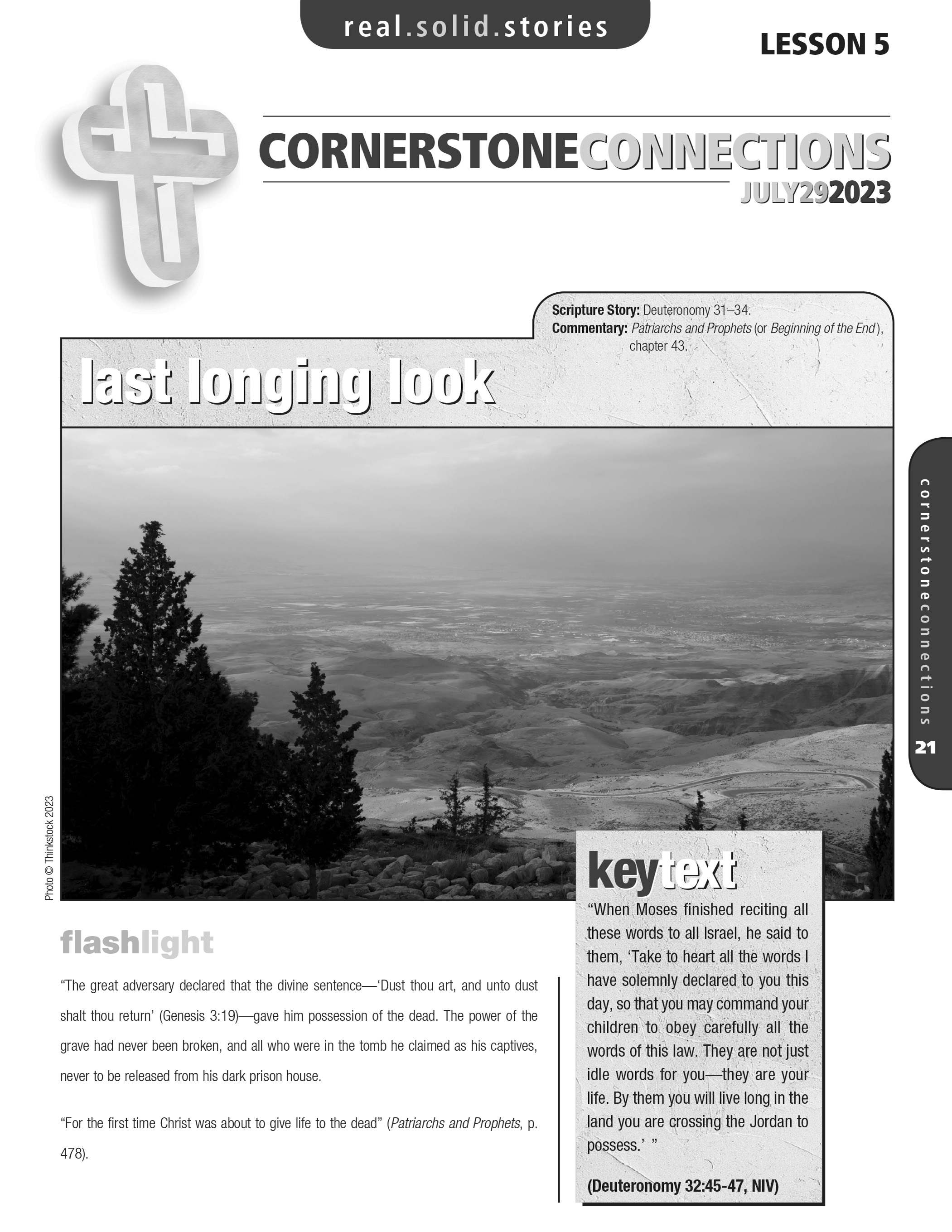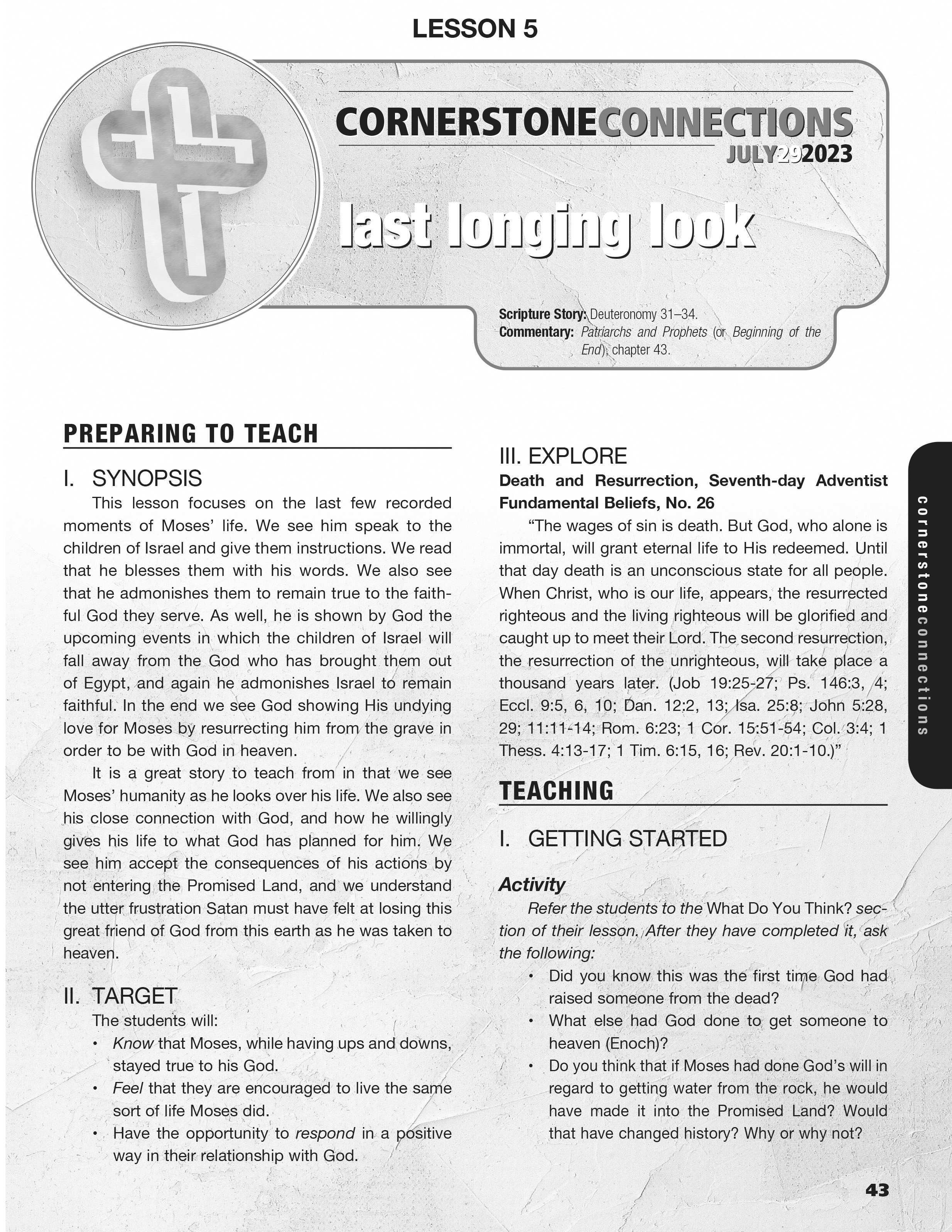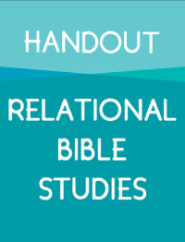"Last Longing Look"
Click below to download the Cornerstone Connections leader’s guide and student lesson. This week’s resources also include two lesson plans and a discussion starter video which offer different ways of looking at the topic. Each lesson plan includes opening activities, scripture passages, discussion questions, and real-life applications.
Moses’ humanity is evident as he looks over his life; however, his close connection with God is also clear as he willingly gives his life to what God has planned for him.
Scripture Passages
OVERVIEW
The theme of the Bible could be summarized in one word, the Gospel. Each story, promise, prophecy, and song reveals the Gospel. The life of Moses teaches us countless lessons about the Gospel and how amazing it really is to be saved by grace. Just as Moses did not enter the earthly promised land, you also might not have every problem solved or disease healed on this earth. Instead, God’s all-powerful grace provided Moses with his all-seasons-pass to the ultimate promised land. God’s promise is not for this earth to be perfect for His faithful people, but for you to live eternally in the sinless new earth someday.
In the story of Moses, it is obvious that God does not play favorites. His justice prevailed, and Moses experienced the consequences of his sin. You can find hope for your sin-stained life in this story, because just like Moses, you will find that God’s grace covers your bad choices and sins so that you will not be kept out of God’s eternal promised land. God’s goal has always been redemption, and so His grace flows freely to all who accept His gift of salvation by believing in Jesus.

OPENING ACTIVITY: HEAVEN’S AIRLINE SERVICES
Supplies: unlined 3 x 5-inch index cards, gel pens in various colors, colored pencils.
Moses was the first person to ever be resurrected from the dead. He basically got to take a first-class, one-way flight to heaven with Jesus as his private pilot. Use the index cards to illustrate the story of Moses’ death, resurrection, and how Moses’ story reveals the Gospel. Consider using an index card to make a “one-way ticket to heaven.” Another idea is to make a series of cards that illustrate justice, grace, and salvation in the story of Moses. Discuss the following points as you draw.
DISCUSSION
BIBLE STUDY GUIDE
Read each Bible passage, then discuss the questions.
Everlasting Mercy
Read Lamentations 3:22-24.
22 Because of the Lord’s great love we are not consumed,
for his compassions never fail.
23 They are new every morning;
great is your faithfulness.
24 I say to myself, “The Lord is my portion;
therefore I will wait for him.”
DISCUSSION
It All Ends Well
Read John 16:33.
33 “I have told you these things, so that in me you may have peace. In this world you will have trouble. But take heart! I have overcome the world.”
DISCUSSION
Trust & Courage
Read 2 Corinthians 12:9.
9 But he said to me, “My grace is sufficient for you, for my power is made perfect in weakness.” Therefore I will boast all the more gladly about my weaknesses, so that Christ’s power may rest on me.
DISCUSSION

APPLICATION
You can find so much peace, reassurance, and hope in God’s gift of eternal life. Sin has damaged this world and messed up lives, but Jesus will one day make everything pure and perfect. The Gospel is built on the tragedy of sin, and it is revealed in the miracle of grace.
God gives grace to you freely. He desires to be with you, loving you forever and ever. Like Moses, you are likely to find yourself missing out on some of the “perfect” experiences on this earth, but as you put your focus on God, you can know that His perfect, eternal plan is the best.

SCRIPTURE PASSAGE
LEADER’S NOTE
For a Relational Bible Study (RBS) you’ll want to get into the Scripture passage and encourage the youth to imagine participating in the story while it’s happening. Then you will be able to better apply it to your own situation today.
You will need to ask God for the Holy Spirit to be present as your small group discusses the questions (no more than 3-6 people in a group is recommended). Start with the opening question. It is a personal question and the answer is unique for each individual. There is no right answer and nobody is an expert here, so don’t be surprised when you hear different responses. You are depending on the Holy Spirit to be present and to speak through your group. Say what God prompts you to say, and listen to what others share.
Take turns reading the chapter out loud. Follow that with giving the students some time to individually mark their responses to the questions (a PDF version of the handout is available as a download). This gives each person a starting point for responding when you start to share as a group. Next, begin the discussion by asking the students to share what they marked and why on each question as you work your way through. Feel free to take more time on some questions than others as discussion warrants.
Encourage each person in the group to apply what is discussed to their personal lives and to share with the group what they believe God wants them to do. Then ask them to pray that God will help each of them to follow through in doing so. Remind them to expect that God will show them ways to live out the message of this passage in the coming week, and that they are free to ask others in the group to help hold them accountable.
OVERVIEW
Historical perspective makes a difference. The Scripture passage for this Relational Bible Study comes from the end of Deuteronomy—the last of the first five books of the Bible, sometimes called the Pentateuch (literally “five books”), and written by Moses (except the last few verses, obviously).
Anyway, we’re at the very end of the life of Moses for this Relational Bible Study. This isn’t Moses miraculously saved from Pharaoh’s death decree for Hebrew baby boys to be thrown into the Nile River. This isn’t Moses running for his life from Pharaoh after he killed an Egyptian at the age of 40. Nor is this Moses during those 40 years of being a shepherd in the wilderness—that’s a very, very long time. And it’s not Moses leading the Israelites out of Egyptian slavery and the 10 plagues and all the drama that went with that. Nor is it Moses crossing the Red Sea or at Mount Sinai. A lot of history has passed by this time.
Moses’ siblings, Miriam and Aaron, have died, as have just about everyone who complained when the spies returned from Canaan and the majority whined that God couldn’t provide what He had promised—a place for them in luscious Canaan.
As Moses came to the end of his life, the book of Deuteronomy (“second giving of the law”) provides a summary overview from Moses to the people of God. Our study for today focuses on the end of this last book of the Pentateuch. A looming question has to be, “What will happen after Moses is no longer leading the Children of Israel?” They hadn’t known any other leader. Was Joshua up to the task? Why couldn’t Moses take them across the Jordan River and into the Promised Land? Why had it taken 40 years to get to this point?
For young people, it’s sometimes difficult to get a historical perspective of 120 years when they might not have even lived 20 years yet. But they have active imaginations and are likely capable of putting themselves in the place of others. Use this lesson to challenge them to step up into roles of leadership, and to do so even now. Invite them to put themselves into the story of Deuteronomy 31.
What Will Happen?
What is something your parent(s) have passed on to you?
Read Deuteronomy 31:1-29.
Then Moses went out and spoke these words to all Israel: 2 “I am now a hundred and twenty years old and I am no longer able to lead you. The Lord has said to me, ‘You shall not cross the Jordan.’ 3 The Lord your God himself will cross over ahead of you. He will destroy these nations before you, and you will take possession of their land. Joshua also will cross over ahead of you, as the Lord said. 4 And the Lord will do to them what he did to Sihon and Og, the kings of the Amorites, whom he destroyed along with their land. 5 The Lord will deliver them to you, and you must do to them all that I have commanded you. 6 Be strong and courageous. Do not be afraid or terrified because of them, for the Lord your God goes with you; he will never leave you nor forsake you.”
7 Then Moses summoned Joshua and said to him in the presence of all Israel, “Be strong and courageous, for you must go with this people into the land that the Lord swore to their ancestors to give them, and you must divide it among them as their inheritance. 8 The Lord himself goes before you and will be with you; he will never leave you nor forsake you. Do not be afraid; do not be discouraged.”
Public Reading of the Law
9 So Moses wrote down this law and gave it to the Levitical priests, who carried the ark of the covenant of the Lord, and to all the elders of Israel. 10 Then Moses commanded them: “At the end of every seven years, in the year for canceling debts, during the Festival of Tabernacles, 11 when all Israel comes to appear before the Lord your God at the place he will choose, you shall read this law before them in their hearing. 12 Assemble the people—men, women and children, and the foreigners residing in your towns—so they can listen and learn to fear the Lord your God and follow carefully all the words of this law. 13 Their children, who do not know this law, must hear it and learn to fear the Lord your God as long as you live in the land you are crossing the Jordan to possess.”
Israel’s Rebellion Predicted
14 The Lord said to Moses, “Now the day of your death is near. Call Joshua and present yourselves at the tent of meeting, where I will commission him.” So Moses and Joshua came and presented themselves at the tent of meeting.
15 Then the Lord appeared at the tent in a pillar of cloud, and the cloud stood over the entrance to the tent. 16 And the Lord said to Moses: “You are going to rest with your ancestors, and these people will soon prostitute themselves to the foreign gods of the land they are entering. They will forsake me and break the covenant I made with them. 17 And in that day I will become angry with them and forsake them; I will hide my face from them, and they will be destroyed. Many disasters and calamities will come on them, and in that day they will ask, ‘Have not these disasters come on us because our God is not with us?’ 18 And I will certainly hide my face in that day because of all their wickedness in turning to other gods.
19 “Now write down this song and teach it to the Israelites and have them sing it, so that it may be a witness for me against them. 20 When I have brought them into the land flowing with milk and honey, the land I promised on oath to their ancestors, and when they eat their fill and thrive, they will turn to other gods and worship them, rejecting me and breaking my covenant. 21 And when many disasters and calamities come on them, this song will testify against them, because it will not be forgotten by their descendants. I know what they are disposed to do, even before I bring them into the land I promised them on oath.” 22 So Moses wrote down this song that day and taught it to the Israelites.
23 The Lord gave this command to Joshua son of Nun: “Be strong and courageous, for you will bring the Israelites into the land I promised them on oath, and I myself will be with you.”
24 After Moses finished writing in a book the words of this law from beginning to end, 25 he gave this command to the Levites who carried the ark of the covenant of the Lord: 26 “Take this Book of the Law and place it beside the ark of the covenant of the Lord your God. There it will remain as a witness against you. 27 For I know how rebellious and stiff-necked you are. If you have been rebellious against the Lord while I am still alive and with you, how much more will you rebel after I die! 28 Assemble before me all the elders of your tribes and all your officials, so that I can speak these words in their hearing and call the heavens and the earth to testify against them. 29 For I know that after my death you are sure to become utterly corrupt and to turn from the way I have commanded you. In days to come, disaster will fall on you because you will do evil in the sight of the Lord and arouse his anger by what your hands have made.”
1. Who is an important leader who is no longer able to lead you?
2. Who will be the next leader—the next “Joshua”—in your life?
3. How does God continue to lead when human leaders change?
4. How did God pass on His will/plan for the next generation?
5. Why do people worship someone or something other than God/Yahweh?
6. What would bring you back to God if you rebelled or became stubborn?
7. What are important characteristics of leaders? Do you do better as a leader or as a follower?
8. If you were Moses, what thoughts and feelings would you have had at this time—the end of your life, not being able to enter the Promised Land, and receiving these final messages from God?
SUMMARY
The amazing life of Moses was coming to an end. What would happen next? God had provided the next leader in the form and training of Joshua (“Yahweh saves” in Hebrew; “Jesus” in Greek). But God also renewed the covenant with His people, provided a written version of the law—God’s instructions for how to live—and had the priests put it inside the ark of the covenant. And He told them to repeat this in a public gathering of all the Israelites every seven years (Sabbatical) at the Feast of Tabernacles in a ceremonial way to repeat it orally, publicly, and at a gathering of everyone. The application seems obvious—what are we doing to continue God’s leadership from one generation to another, plus “when” and “how” do we keep renewing God’s covenant with us?

APPLICATION
Here are three ideas for applying this Relational Bible Study to your life this week! Choose one or more of these, or let them spark other applications in your life. Talk about it with others in your Youth Sabbath School, then encourage and pray for each other to put God’s word into practice in your lives.
Many people don’t expect youth to be leaders. Many youth don’t expect to be leaders—at least not yet, and certainly not at church. If that perspective shows itself at your church, it needs to change.
What laws has God given you? Many Christians think of the 10 Commandments (Exodus 20:3-17 or Deuteronomy 5:7-21) or the Sermon on the Mount (Matthew 5-7). Jewish people would consider God’s laws to be everything God has told them to do. That includes short but potent verses like Micah 6:8.
Following our passage today (Deuteronomy 31), you can read “The Song of Moses” in Deuteronomy 32:1-43. The last book of the Bible, Revelation, describes those who remain faithful to God. According to Revelation 15:3, they “sing the song of Moses, the servant of God, and the song of the Lamb.”





